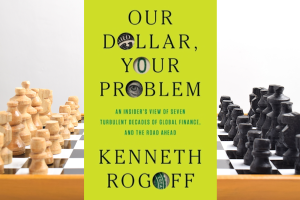The solvency of the U.S. government is not in any serious doubt. The imminent S&P downgrade of Treasury debt is not about economics; it is about politics. It is, at root, about the public display of political dysfunction in Congress.
One symptom of this dysfunction is the current brinkmanship over the debt ceiling. Since there is no real solvency problem, the point seems to be to provoke a liquidity crisis, and to use that crisis to force the other guy to back down.
On this point, impressively, bi-partisan agreement is the rule.
Liquidity crisis is serious business, as we found out in 2007-2009.
Personally, I think the prospect of even technical default is vanishingly remote. If worse comes to worst, the Fed will certainly backstop markets in Treasury securities, so holders will have no trouble turning them into cash.
What worries the markets, and what worries me, is the willingness of Congress to provoke such a crisis in the first place. Liquidity crisis is serious business, as we found out in 2007-2009.
But we also found out that, in the last resort, the Fed can and will backstop markets. Economists fuss about the consequent moral hazard—bankers who know they are going to be bailed out have incentive to take more risk.
What we are watching in Congress is a public sector equivalent—politicians who know they are going to be bailed out have incentive to take more risk, and they are taking it.
But it is not just them, enticed by their safety belts into driving too fast on a deserted road. We are all on that road. The liquidity crisis they are threatening to provoke is a world liquidity crisis. That is what the markets are reacting to.
Even supposing that I am right about the Fed’s backstop of Treasury securities, it is not at all clear that the Fed is prepared to backstop everything else. In 2007-2009 it took a while before “unusual and exigent circumstances” empowered action under 13(3). And even that action brought down on the Fed’s head a mountain of unaccustomed criticism, most recently the Government Accountability Office one-time audit. The Fed would be even more reluctant to act today.
And now, after Dodd-Frank, the Fed’s hands are tied much tighter; the Fed is much less able to act as well. Take a look at the new 13(3). The approval of the Secretary of the Treasury is not required for discount of Treasury debt, but it is for everything else—Section 13 (3) B.iv.
That is what the markets are reacting to, a Congress that seems determined to provoke world liquidity crisis as a way of forcing the other guy to back down, and a Fed that has been hobbled by that very same Congress.





